The most lifelike way to replace a full arch of failing or missing teeth with dental implants.
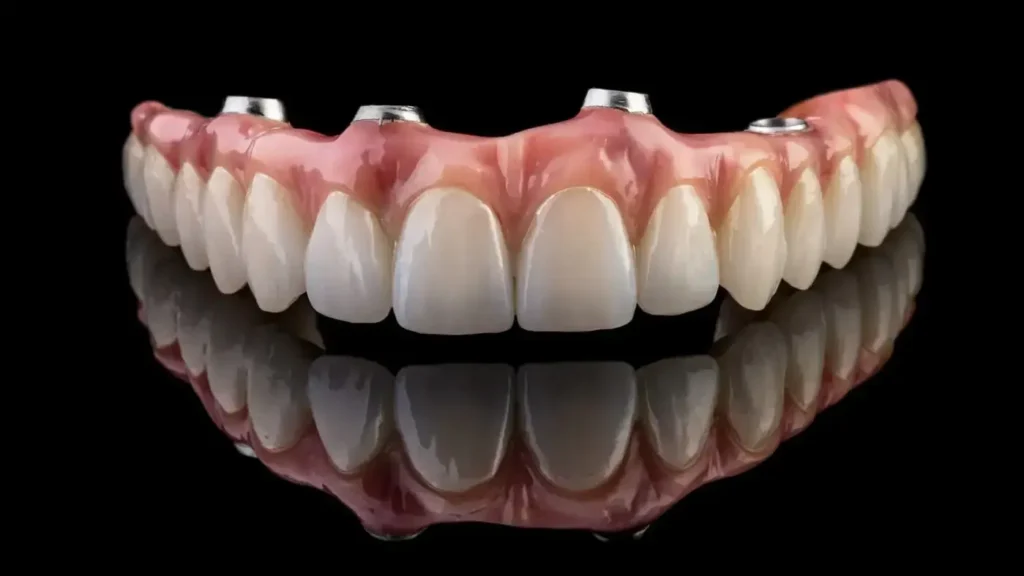

The All-On-4, “Teeth in a Day” procedure consists of removing any remaining teeth, placing implants, and then securing a beautiful, fixed, functional smile over the course of a single day!
This procedure will not only give patients the beautiful smile of their dreams, but also give them a fresh outlook on life. We see countless patients suffering with extensive decay, old or failing dental work, and broken teeth. For these patients, All-On-4, “Teeth in a Day” is the perfect solution to obtain a beaming smile and fix the dental problems that have plagued them for years.
The All-On-4 procedure involves removing your remaining teeth, placing 4-6 implants per arch, and securing a low-profile bridge to the implants. The implants are often placed at specialized angles to avoid the patient’s sinuses. This also avoids the need for expensive bone grafts that come with long healing times.
The traditional All-On-4 procedure involves 4 implants and acrylic denture teeth over a titanium frame. Our doctor has modified this procedure to provide an even better result for his patients based on his experience successfully placing countless dental implants. At Deep River Family Dental, we carefully analyze each and every case and base our treatment on your individual anatomy. Your doctor will place between 4 and 6 implants per arch and temporary fixed bridges will be secured while your implants integrate with your jawbones and your mouth heals.
After your healing is complete, the doctor and lab technician will design your final All-On-4 teeth with zirconia, which is a premium material that’s much stronger than the traditional acrylic (plastic) denture teeth offered at most other dental offices. Zirconia gives a more natural, life-like result which is also more hygienic and resistant to staining. This means your teeth will last longer and look better than the acrylic/titanium hybrid bridges you’ll find with many other All-On-4 specialists.
The All-On-4 procedure involves removing your remaining teeth, placing 4-6 implants per arch, and securing a low-profile bridge to the implants. The implants are often placed at specialized angles to avoid the patient’s sinuses. This also avoids the need for expensive bone grafts that come with long healing times.
The traditional All-On-4 procedure involves 4 implants and acrylic denture teeth over a titanium frame. Our doctor has modified this procedure to provide an even better result for his patients based on his experience successfully placing countless dental implants. At Deep River Family Dental, we carefully analyze each and every case and base our treatment on your individual anatomy. Your doctor will place between 4 and 6 implants per arch and temporary fixed bridges will be secured while your implants integrate with your jawbones and your mouth heals.
After your healing is complete, the doctor and lab technician will design your final All-On-4 teeth with zirconia, which is a premium material that’s much stronger than the traditional acrylic (plastic) denture teeth offered at most other dental offices. Zirconia gives a more natural, life-like result which is also more hygienic and resistant to staining. This means your teeth will last longer and look better than the acrylic/titanium hybrid bridges you’ll find with many other All-On-4 specialists.
Most patients will be a candidate for the All-On-4 procedure, even those who have been told they don’t have enough bone for dental implants. Your doctor will use a combination of straight and angled implants to avoid the sinuses and engage the strongest part of your jawbone. This technique usually removes the need for expensive and lengthy sinus augmentation bone grafts.
Your doctor will perform a thorough evaluation during your consultation to see if All-On-4, “Teeth in a Day” is a good option for you.
Zirconia is the “gold standard” material for the All-On-4 procedure. Zirconia is a type of ceramic that is extremely durable and resistant to wear and corrosion, making it an excellent choice for All-On-4 dental restorations.
One of the main benefits of using zirconia for All-On-4 dental implants is its strength and stability. Zirconia bridges can withstand high chewing forces without cracking or chipping, ensuring that your new teeth perform impeccably for decades. Zirconia is also biocompatible, which means it’s unlikely to cause an allergic or inflammatory reaction. This makes it an ideal option for patients with sensitive or allergy-prone skin.
Another advantage of zirconia dental implants is its stunning, natural-looking appearance. Unlike metal or acrylic, zirconia has a translucent quality that closely mimics the look of natural teeth, giving your new teeth a realistic and aesthetically pleasing appearance.
Finally, zirconia is easy to clean, maintain, and can be easily polished to keep its shine and prevent discoloration over time. This helps ensure the longevity and durability of your new All-On-4 teeth.
Overall, zirconia is an excellent choice for All-On-4 dental implants, offering a number of benefits that make it an attractive option for patients seeking a beautiful, long-lasting, natural-looking, and easy-to-maintain smile.
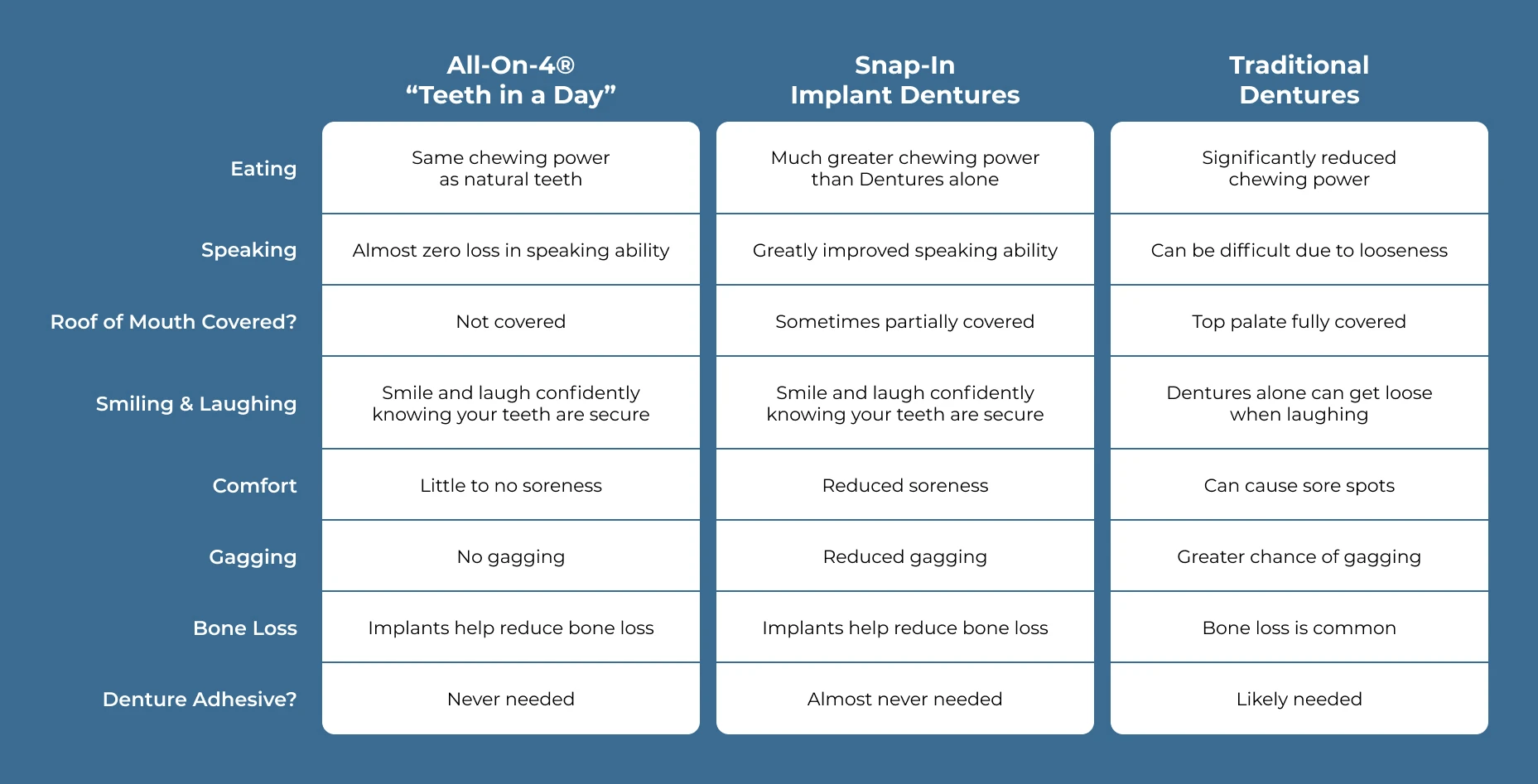
Same-day smiles from actual patients
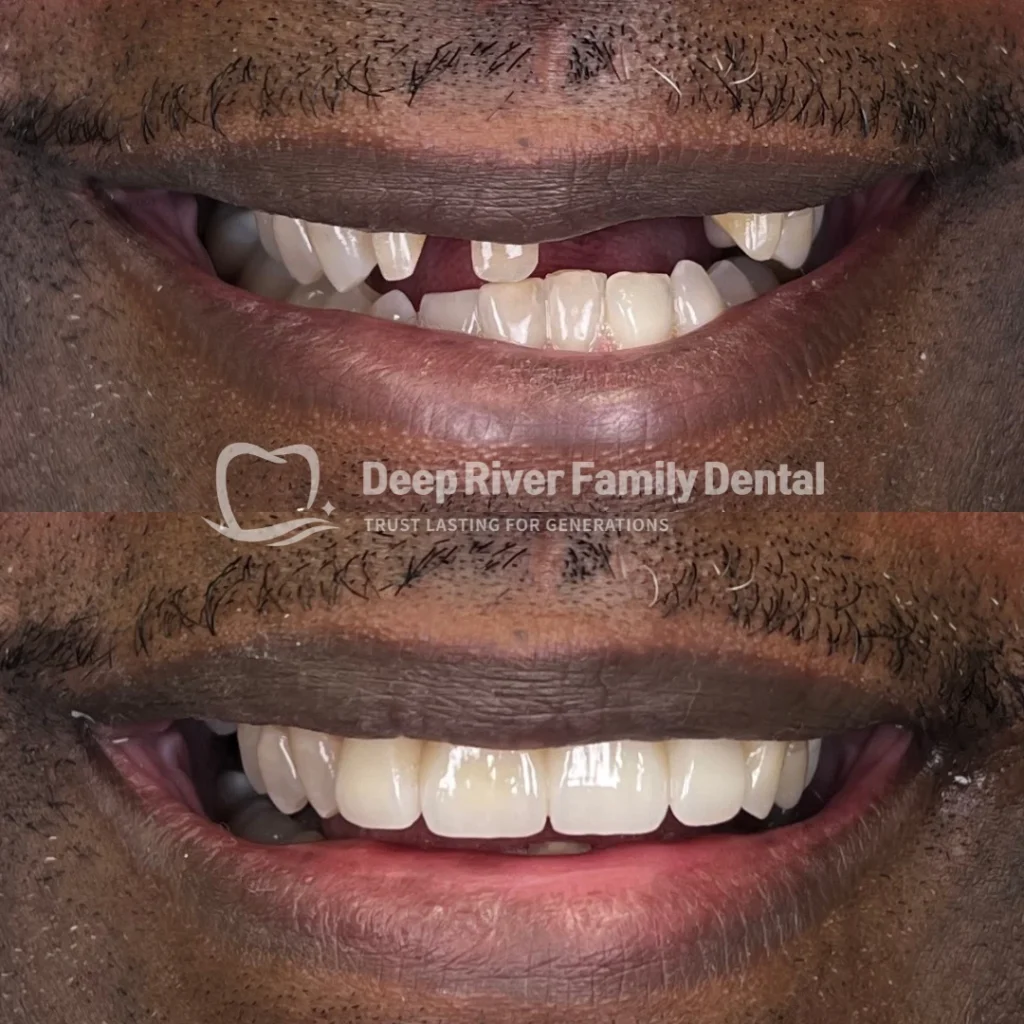
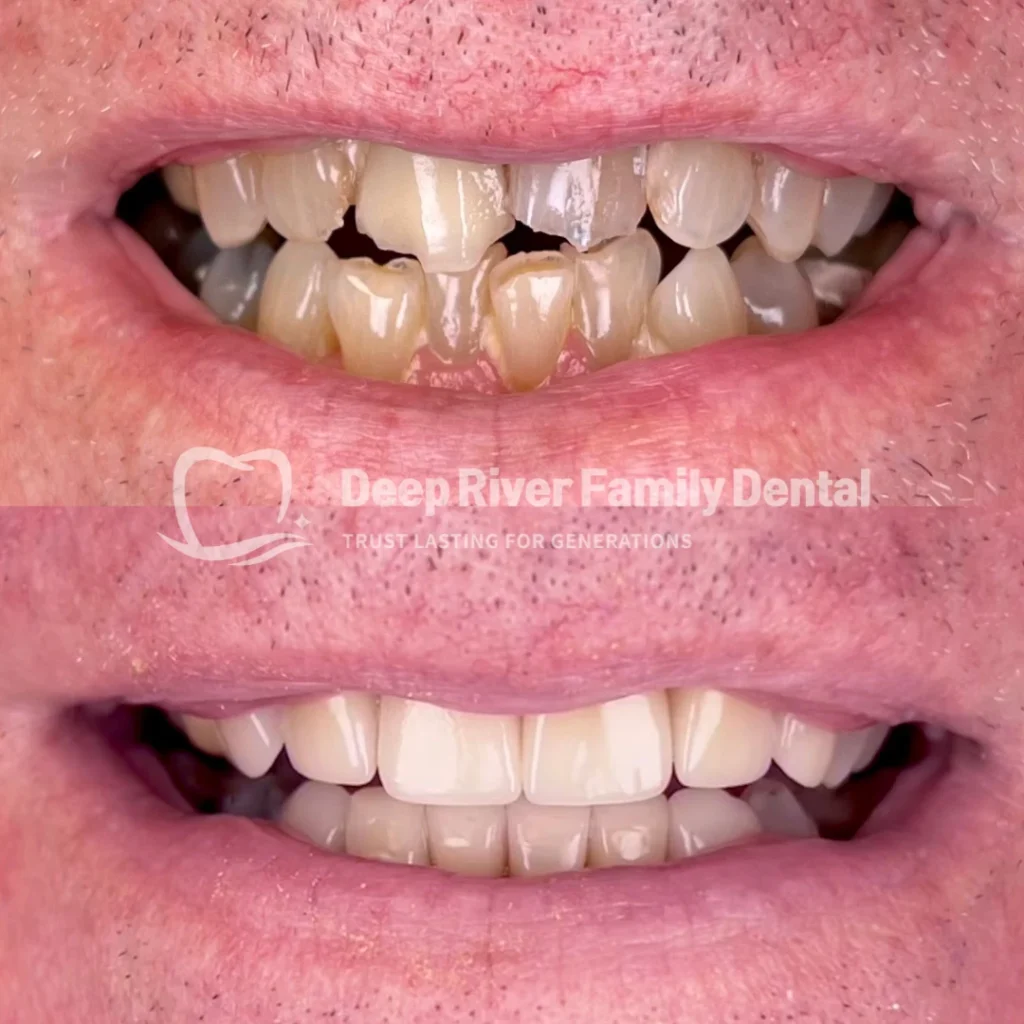
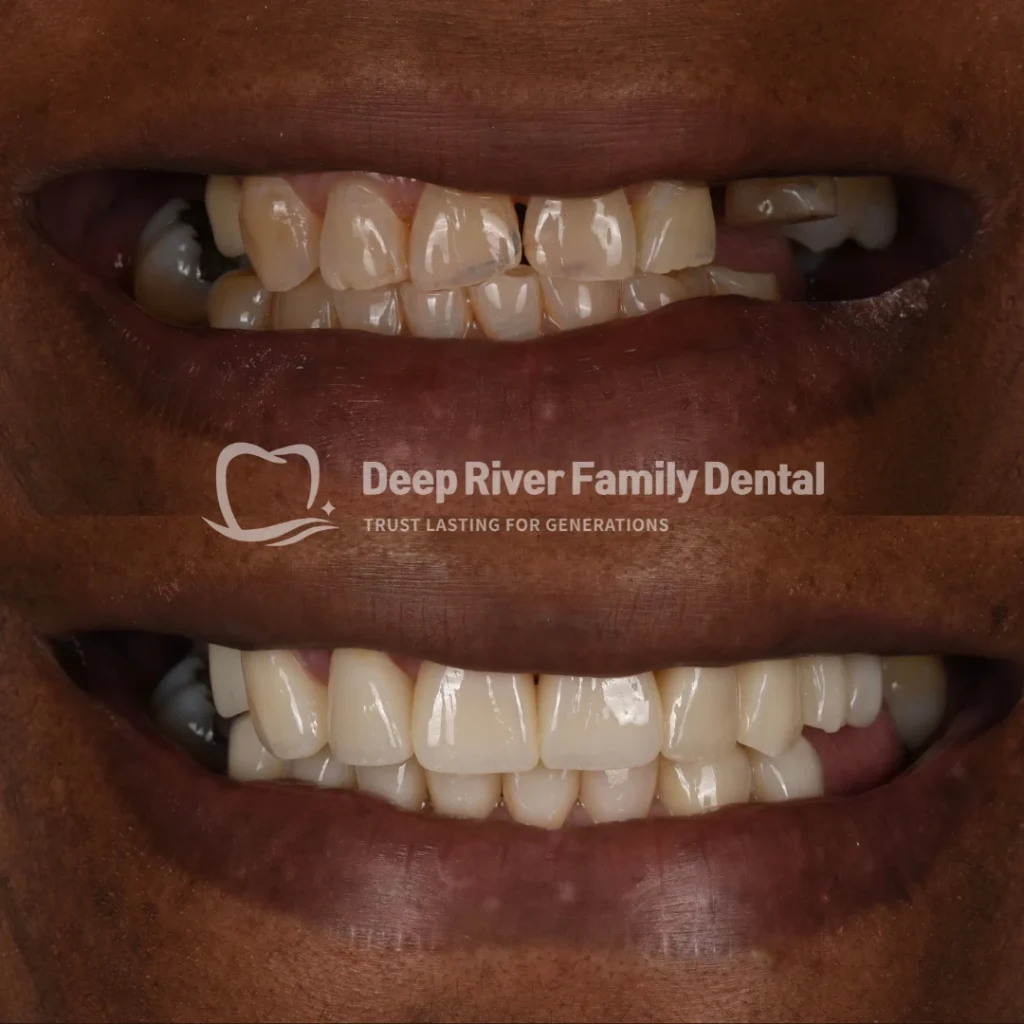
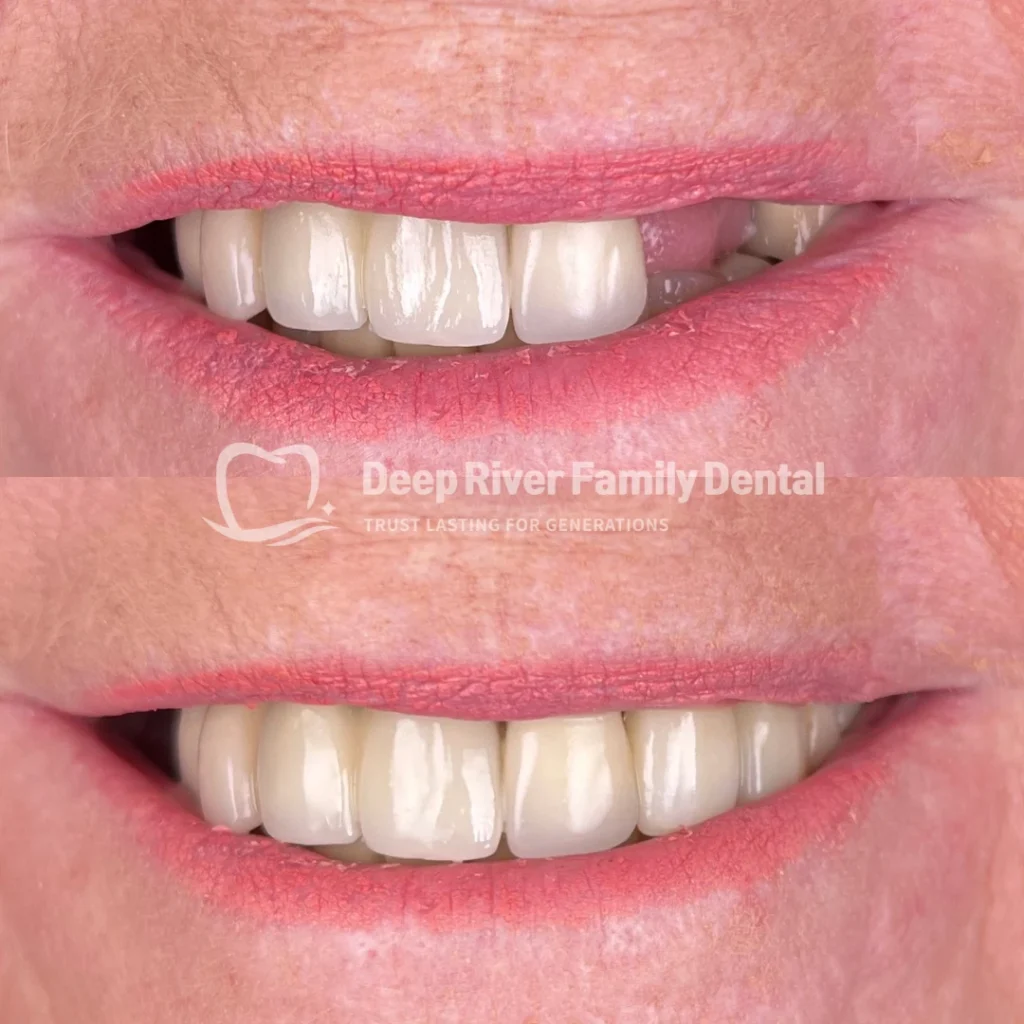
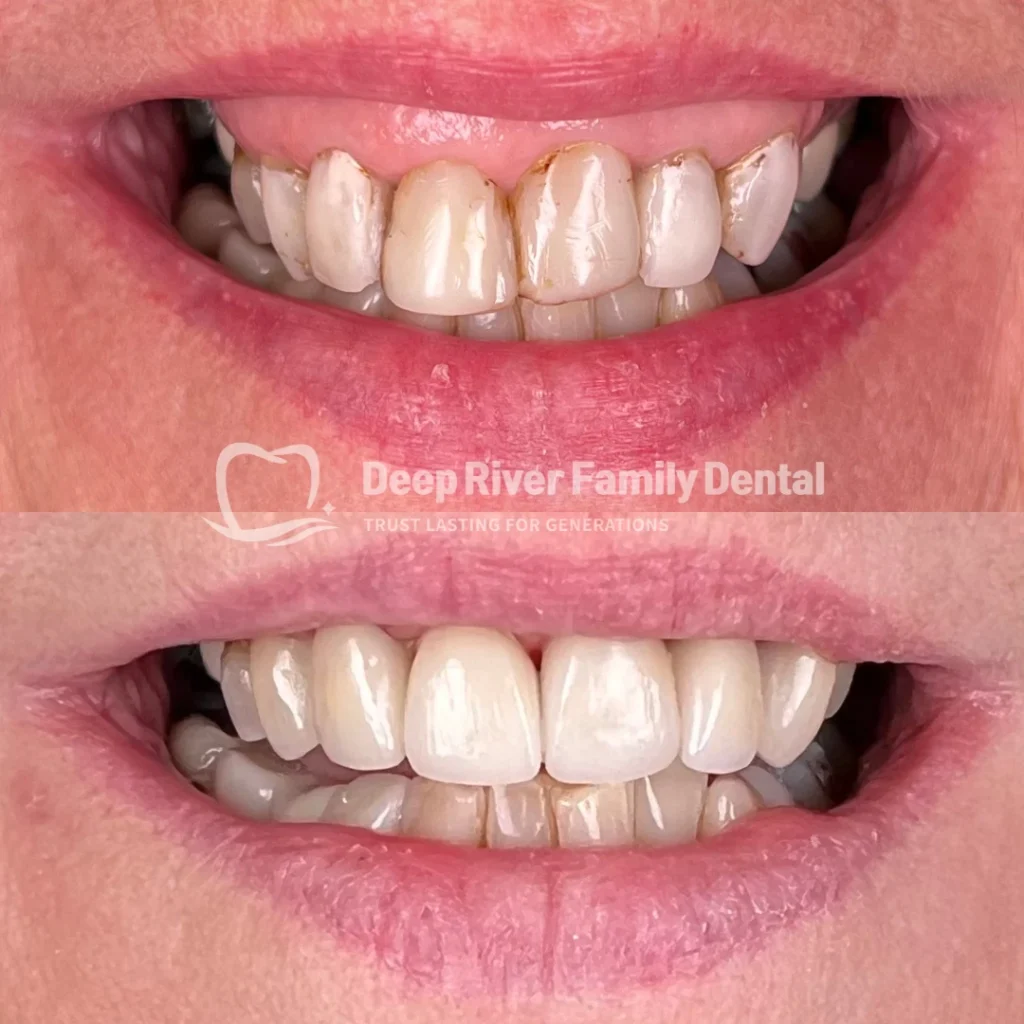
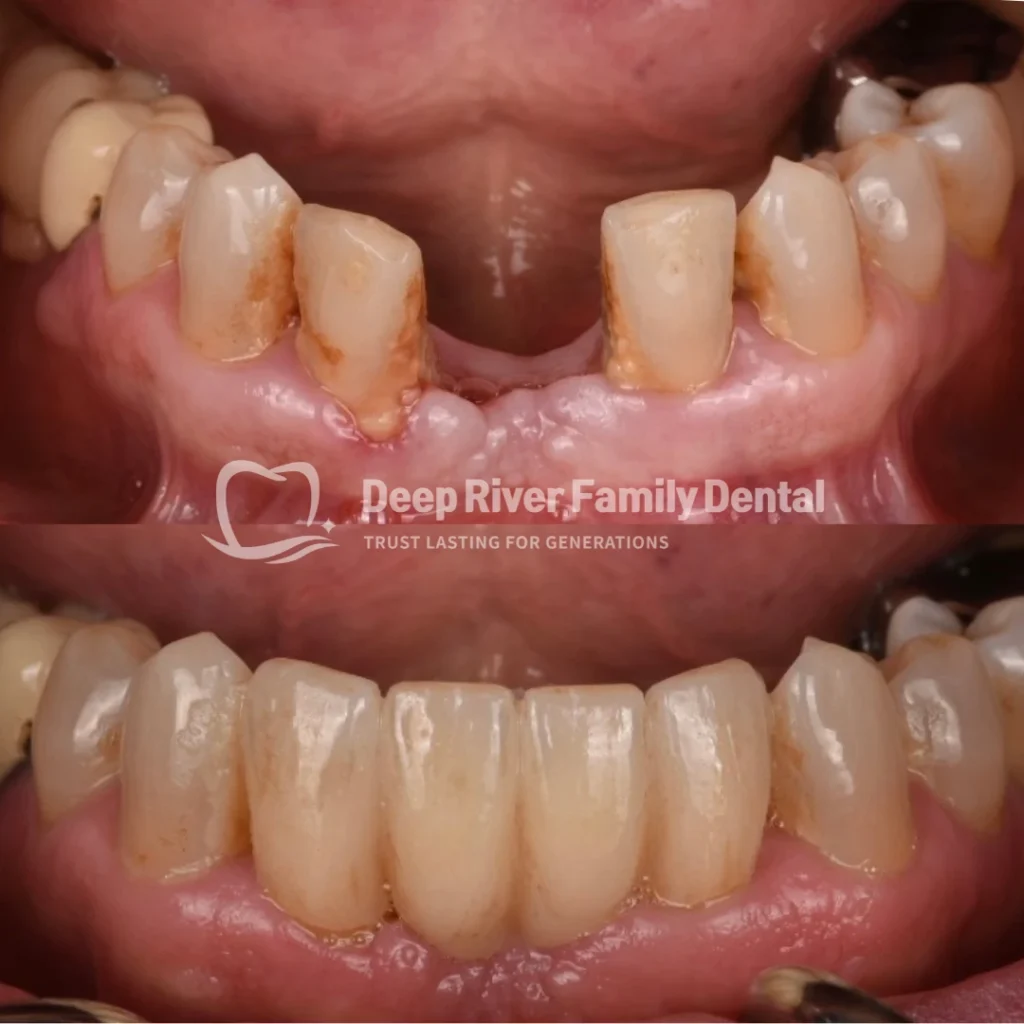
Pricing includes all extractions, as many implants as needed, fixed temporary teeth, and fixed final teeth.
Single Arch
Double Arch
All-Inclusive Bundle
Price includes extractions, implants, bone grafting, and fixed hybrid resin acrylic teeth.
The prices listed are cash prices. There may be additional fees for patients who finance their treatment.
Additional Per Arch
$4,000 off each zirconia final arch now through DATE
Fixed Zirconia final bridge(s) – most durable and ideal aesthetics.
This price is honored when bundled with surgery for cash-paying patients.
Dental Implants are an important investment in yourself. Having the option to break this investment down into monthly payments can help make these life-changing services more accessible and easier to fit into your budget. We work with a variety of financing providers that offer payment plans to cover either all or part of your dental implant procedure. This is a great option for all patients, especially those who are on a fixed income. With these flexible financing options, you can enjoy the benefits of a healthy, beautiful smile without breaking the bank.
Contact us to learn more about our financing options and schedule your FREE Consultation with Dr. Kwon today!
After undergoing an All-on-4 dental implant surgery, it’s important to allow sufficient time for your mouth to heal and for the implants to integrate with the jawbone. While you may be able to resume eating relatively soon after the procedure, it’s unlikely that you’ll be able to eat with your teeth normally from day one.
Immediately after the surgery, you’ll likely experience some swelling, discomfort, and tenderness in the surgical area. It’s essential to follow your dentist’s post-operative instructions, which may include a soft or liquid diet for the initial days or weeks. This diet will help prevent damage to the surgical site and promote healing.
Over time, as the implants stabilize and your mouth heals, you’ll gradually transition to a more varied diet. Your dentist will guide you on when it’s appropriate to introduce harder foods and resume normal eating habits.
It’s important to note that the timeline for recovery and the ability to eat with your teeth can vary from person to person. Factors such as your overall health, bone density, and how well you follow post-operative instructions can influence the speed of your recovery.
The All-on-4 dental implant procedure was developed by Portuguese dentist Dr. Paulo Malo in the late 1990s. Dr. Malo developed this innovative treatment concept as a solution for patients with significant tooth loss or those who were facing the prospect of complete edentulism (no natural teeth remaining). The procedure aimed to provide a fixed and efficient solution for full-arch rehabilitation using dental implants.
The All-on-4 technique involves the strategic placement of four dental implants in the jawbone to support a full arch of prosthetic teeth. The implants are strategically positioned to maximize bone support and minimize the need for additional bone grafting procedures, making it a viable treatment option for patients with reduced jawbone density.
Since its introduction, the All-on-4 procedure has gained widespread recognition and acceptance in the field of implant dentistry. It has provided many patients with a reliable and efficient option for restoring their smile and improving their quality of life. Over time, variations and refinements of the technique have been developed, but the core principles of the All-on-4 concept remain the same.
Caring for your All-on-4 teeth is crucial to maintaining their longevity and keeping your oral health in excellent condition. Here are some tips for caring for your All-on-4 teeth:
New dental implant arches, including those used in All-on-4 procedures, may feel different from natural teeth initially. Here are some aspects of the experience that you may encounter:
It’s important to note that everyone’s experience may vary, and it may take a short period of adjustment to fully adapt to the feel of your new dental implants. If you have any concerns or persistent discomfort, it’s recommended to consult with your dentist. They can assess the fit and make any necessary adjustments to ensure your comfort and satisfaction.
During the All-on-4 dental implant procedure, you will be under anesthesia, which helps ensure that you don’t experience pain or discomfort during the surgery itself. The use of local anesthesia and/or sedation will depend on your specific needs and the recommendation of our dentist.
After the surgery, it’s common to experience some level of discomfort, swelling, and soreness in the treated area. However, the degree of pain can vary from person to person. Some individuals may experience minimal discomfort, while others may have more significant soreness or sensitivity.
We will provide you with instructions on how to manage pain and discomfort after your All-on-4 surgery. This may include prescribing pain medication or recommending over-the-counter pain relievers, such as ibuprofen. Applying ice packs to the outside of your face can also help reduce swelling and alleviate any discomfort.
It’s important to follow your post-operative care instructions carefully, including any dietary restrictions, oral hygiene practices, and taking prescribed medications as directed. These measures will aid in minimizing pain, promoting healing, and reducing the risk of complications.
If you have concerns about pain management or if you experience severe or prolonged pain after your All-on-4 procedure, it’s crucial to contact our office promptly. Our dentist can evaluate your condition and make any necessary adjustments or provide additional guidance to ensure your comfort and well-being throughout the healing process.
After an All-on-4 procedure, it is common to experience some degree of discomfort or pain. The level of pain can vary depending on individual factors such as pain tolerance, the complexity of the procedure, and the body’s healing response. Typically, the first 48 hours after the procedure is when you will experience the most discomfort. However, the pain is typically manageable and should subside over time as the healing progresses.
The recovery time for an All-on-4 procedure can vary from person to person, and it depends on several factors such as your overall health, the complexity of your case, and how well you follow post-operative care instructions.
Typically, the initial healing takes a few weeks. Complete recovery and adjustment to the new teeth can extend over several months. Each person’s recovery time can vary, so it’s best to consult with our dentist, who can provide more specific information based on your individual case and guide you through the recovery process.
There are many things that we do at Deep River Family Dental that set us apart. From our delicate and personalized care, to our ability to reduce cost through the use of cutting-edge technology, we strive to go above and beyond to deliver the highest level of care at the best price in the area.
Many dental implant practices will advertise a low price as “bait”, and add additional costs for their premium options. Not us – all of our prices include top-of-the-line final zirconia bridges and there are no hidden costs or fees.
While this may be a good option for some patients, in the rare case of complications, it may be difficult to continue working with the same doctor who placed your dental implants if you traveled thousands of miles or out of the country. Most local offices will not be willing to fix these “out of town” cases. One advantage of having a temporary set of fixed teeth on the day of your surgery is that you get to test them out and see what you like and don’t like. For your final zirconia bridges, we can do try-ins to ensure that your teeth look exactly how you want them to look. While it’s great to get your final teeth immediately, it does come with some serious downsides that should not be overlooked.
Mini implants have a time and a place for certain individuals who have extremely low bone volume. Most of the time these patients are not candidates for a traditional All-On-4 implant procedure and would need advanced implants that only a skilled surgeon should take on. If you are offered mini implants as an option I would recommend getting a 2nd or 3rd opinion to educate yourself on the best treatment route for your needs.
Snap-in dentures are a good alternative to the All-On-4 if you are willing to compromise the quality and function of the denture for the price.
We recommend having them cleaned at least once a year.
Yes, implants can fail and there are many factors that influence a failure. Infection, hygiene, medical conditions, smoking, diabetes, and neighboring tooth infection can all be major risk factors that contribute to an implant failing. It is recommended that you follow our post operative instructions to ensure that you do everything in your power to have a successful implant therapy.
Drooling occurs when a foreign body stimulates the saliva response. This is designed to aid in the breakdown of food when you are chewing. A new denture will mimic that response but don’t worry, your body will adapt and you will return to a normal saliva response in a few days.
Yes! We offer a couple options for sedation depending on what is the right fit for you:
Oral Conscious Sedation involves a prescription for sedative pills that are prescribed to you by our doctor. Sedative medication is typically given the night before to help you sleep, as well as the morning of your procedure to ensure your comfort throughout the procedure.
IV Sedation involves the intravenous administration of sedatives in order to put you in a diminished state of consciousness throughout the entire procedure. This also has other benefits for reducing post-operative swelling and pain.
No, All-on-4 bridges are not always attached to the implants on the same day as the procedure. The timing of attaching the bridge depends on the individual case and the recommendation of our dentist. Here are two common approaches:
The decision regarding immediate loading or delayed loading is made based on factors such as implant stability, bone quality, surgical complexity, and the patient’s specific needs. Our dentist will evaluate your case and recommend the most suitable approach for you.
Bleeding after an All-on-4 procedure is normal and expected during the immediate post-operative period. The duration and amount of bleeding can vary from person to person, but typically it should subside within the first 24 to 48 hours after the surgery.
If you notice that bleeding persists beyond the expected timeframe or if you experience severe or uncontrollable bleeding, it’s important to contact our office immediately. We can evaluate your situation and provide appropriate guidance or interventions to address the issue.
After an All-on-4 surgery, you may need some time to adjust to and learn how to use your new teeth properly. While the process of adapting to the new teeth varies from person to person, here are some general considerations:
Remember that each person’s experience and adaptation process can vary. With time, practice, and patience, you should become increasingly comfortable and proficient with using your new teeth. If you have any concerns or difficulties, do not hesitate to reach out to our office.
After receiving new teeth through an All-on-4 procedure, it may take some time to adjust and become comfortable speaking with them. While each person’s experience may vary, here are some general considerations:
The adaptation period will vary from person to person. Some individuals may adjust relatively quickly, while others may require more time and effort. As you continue to use your new teeth for speaking and engage in normal conversations, you should gradually regain confidence and improve your speech.
After an All-on-4 procedure, it is important to follow our dentist’s specific instructions regarding oral hygiene practices, including the use of a water flosser or Waterpik. Generally, you should wait until the healing process is sufficiently advanced (typically 1-2 weeks) before incorporating a water flosser into your oral hygiene routine.
Deciding to undergo any dental procedure, including the All-on-4 procedure, is a personal choice that depends on various factors, including your oral health, specific dental needs, and your dentist’s recommendation. While age can be a consideration, it is not the sole determining factor for determining suitability for the procedure.
The All-on-4 procedure is typically recommended for individuals who have multiple missing teeth, severely damaged teeth, or significant tooth loss. It is designed to provide a fixed and functional set of teeth supported by dental implants. The decision to proceed with the All-on-4 procedure is usually based on factors such as overall oral health, bone density, and individual circumstances.
If you feel like you are too young for the procedure, it is important to discuss your concerns with your dentist. They will evaluate your specific situation, assess your oral health, and discuss the available treatment options with you. They can provide insights into the benefits, risks, and long-term considerations associated with the procedure, taking into account your age and individual circumstances.
Remember that age alone does not determine eligibility for the All-on-4 procedure. It is important to have a comprehensive evaluation and discussion with your dental professional to determine the most appropriate treatment plan for your specific needs and goals. They can address any concerns you may have and help you make an informed decision about your dental care.
Preparing for your recovery after an All-on-4 procedure can help ensure a smoother healing process. Here are some items you may want to have ready:
High quality Zirconia. To learn more about Zirconia click here.
At Deep River Family Dental, a single arch costs $19,999 and both arches (full mouth) are $39,999, but working through your insurance can lower this cost substantially.
We are completely transparent with our pricing with no hidden fees or add-ons. These prices include:
If the quality of the bone can achieve enough primary stability to pass a specific threshold, then the implants can be connected to a denture during the healing phase. The denture splints the implants together, allowing it to not move, thus they will predictably integrate into the bone.
Don’t let one dentist’s opinion keep you from pursuing a life-changing solution with All-On-4 dental implants. There are several techniques in implant placement that can be used to have a successful outcome.
Yes! This is the ideal situation because you will have the most bone volume the day the teeth are removed.
No, Dr. Kwon is a general dentist that has dedicated 100’s of hours of continuing education on implant dentistry. Our doctor continues to travel throughout the world to learn the latest techniques in this field of work.
Yes! We work with a number of financing companies. Patients who would like to break their treatment costs into affordable monthly payments can benefit from working with a financing company. It’s easy and quick to apply for, and you’ll receive a decision right away so you can proceed with your treatment promptly. Click here to view our financing options.
The procedure typically takes 3-4 hours per jaw.
Our digital approach using the latest technology allows us to adjust the design of your denture to create multiple prototypes. If you wish to make changes to the design we can easily accommodate your preferences until you are satisfied with both the shape and color. It is important to keep in mind that once you agree on a design and your final teeth are fabricated you will not be able to change the shape/color free of charge.
Most people try to save money by flying throughout the continental United States or even to international clinics. We would caution against this because if something were to go wrong, such as a denture breaking or an implant not integrating, you would want to have your surgeon on call and available to fix it as soon as possible. Traveling abroad can often be more expensive compared to coming to our office, especially since our pricing is already less than the competition.
No they do not. Your All-On-4 bridges are rigidly attached to your implants, which are firmly anchored in your jaw. If your All-On-4 teeth begin rocking for any reason, call us so we can bring you in for an evaluation.
It is referred to as “Teeth In a Day” because you are receiving a set of functional prosthetic temporary teeth in one day. Because there are often major changes in your mouth during the healing and implant integration phase, it is best to start with temporary teeth. This ensures the best long-term outcome with your permanent teeth.
Yes. Your temporary teeth are made of acrylic and can chip, crack, and occasionally break. A great benefit of acrylic temporary is that it can easily be repaired. If you have any issues with your temporaries, just give us a call and we’ll get you fixed up right away.
While it is possible for zirconia to be damaged, it is extremely uncommon. Zirconia is amongst the strongest and most durable materials available in the dental world.
Unfortunately, no. We cannot use your existing implants and they will most likely need to be removed. The reasoning is twofold:
No, you will not be able to remove your All-On-4 bridge(s) by yourself. Only a dentist can remove the bridge(s).
Yes, food can get stuck underneath the bridge(s). That is why we recommend daily use of a Waterpik and Proxabrushes for cleaning.
Generally, 4-7 days is sufficient. With that said, there is always the chance of bruising and swelling, and you’ll need to get used to eating and speaking with your new teeth. The longer you can take off the better.
The procedure itself typically takes 4-6 hours depending on whether you are having a single arch treated (upper or lower) or both arches (full mouth). When you leave our office, your temporary All-On-4 bridge(s) will be securely attached to your new implants.
You will wear your temporary bridge(s) for about 4 months to allow time for your implants to integrate with your bone and for your jaw and gums to heal into a stable, long-term position before we fabricate your final bridge(s). This healing time ensures the closest possible fit for your final bridges.
After you have healed, we will begin fabricating your final All-On-4 bridge(s). This involves a few appointments over a 5-6 week period, during which time you’ll help us design your ideal smile for your permanent teeth.
We are happy to help you book an appointment or answer your questions. Please fill out our contact form and we will get back to you shortly!